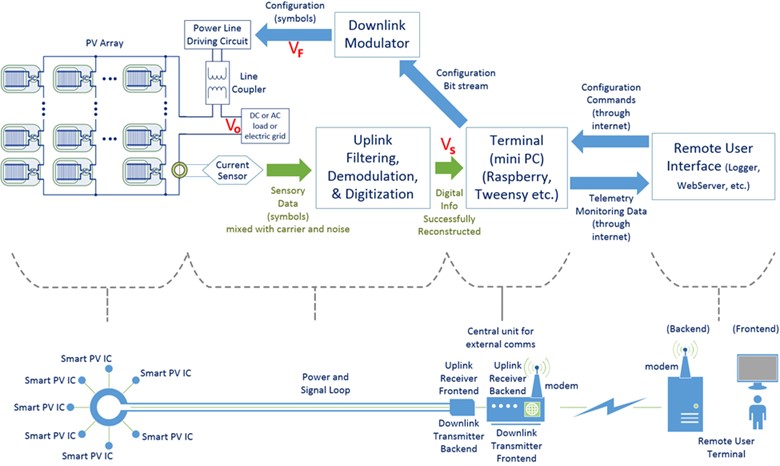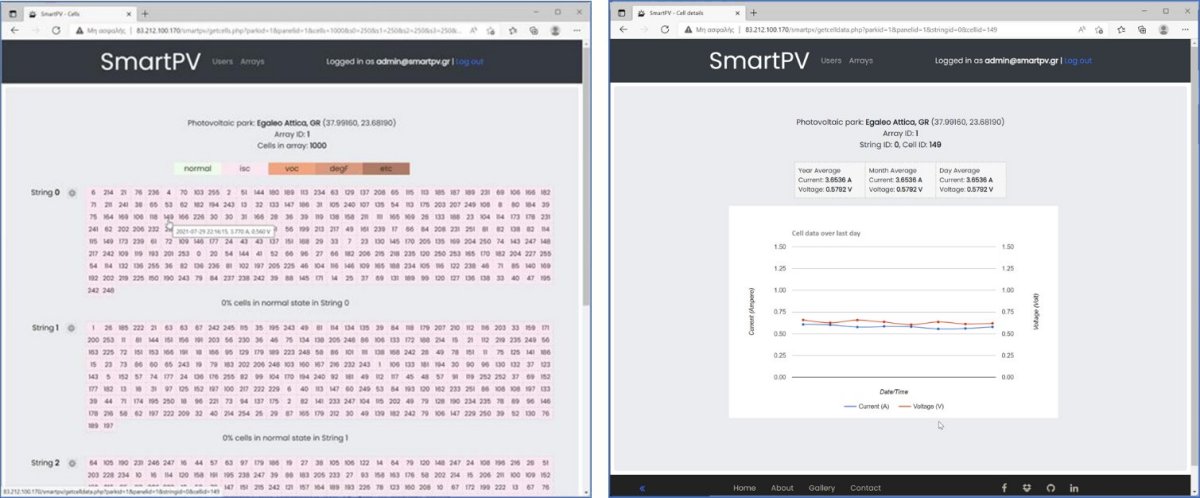
Development of a Smart Photovoltaic Cells system – SmartPV
Co-financed by the European Regional Development Fund of the European Union and Greek national funds through the Operational Program Competitiveness, Entrepreneurship and Innovation, under the call RESEARCH – CREATE – INNOVATE (project code:Τ1EDK-01485)
During the last years there has been an increasing demand for the utilization of solar energy for electric-energy generation purposes. A rapid increase of the installed Photovoltaic (PV) capacity has been performed both in the European Union and outside Europe over the last 10 years and it is expected to continuously expand.
In the framework of the project SmartPV – “Development of a Smart Photovoltaic Cells system” (https://smartpv.gr) an innovative system that is responsible for the management of the energy produced from photovoltaic cells is implemented. The breakthrough of the Smart Photovoltaic Cells is that they comprise an integrated circuit (IC) that manages and processes the available power at the PV cell level in contrast to conventional PV systems that perform the energy management process in arrays of PV cells/panels.
The final IC is responsible for the maximization and management of the energy produced by each solar cell, the detection of malfunctions as well as the remote (through the power lines) control and monitoring of each Smart Solar Cell.
Specific research targets include:
- Design of high-efficiency energy conversion microelectronic circuitry (including DC/DC converter, H-brigde) with ultra-low-power parasitic consumption
- Design of digitally on-chip implemented MPPT unit to operate each cell to its maximum power without disturbing the operation of other cells
- Design of a control unit for the remote control of the DC/DC converter as well as of the H-bridge
- Design of the communication unit
- Development of the appropriate algorithms for the communication of each solar cell through the power lines

Results
-
The circuit was tested with successful results using multiple smart solar cells.
- The operation of each Smart PV cell is not affected by the solar radiation that is incident to the rest of the PV cells (e.g., due to shading, accumulation of dirt, installation on curved surfaces, etc.)
- Optimal utilization of the available installation surfaces of PV systems can be achieved since it is not necessary to install all individual solar cells of a PV system with the same tilt angle and orientation, while even shaded PV cells will produce electricity without causing a reduction in the energy production of the rest of the PV cells of the same PV array. So, energy production can be maximized even from installation surfaces with limited dimensions.
- Remote monitoring, parameterization, control, fault-detection and fault localization of the individual Smart PV cells can be performed through the power cable that interconnects the Smart PV array with the load, which enables to reduce the installation and maintenance costs of the PV system.
- The latest version of the fault detection and identification algorithm that is based on a machine learning method, has low computational cost providing fast execution time (~8ms), low memory usage (~180 Kb) and valid results for the operation of each solar cell of the monitored Smart PV array. The use of this method in parallel with the ability to parameterize the operation of the Smart PV array enables maximizing the long-term energy yield of the PV system.

Publications
- "Development of a smart photovoltaic cells system", I. Mandourarakis, V. Gogolou, Z. Agorastou, S. Voutsinas, et. al., Energy Conversion and Management 293, 2023.
- "Development of a machine-learning-based method for early fault detection in photovoltaic systems", S. Voutsinas, D. Karolidis, I. Voyiatzis, M. Samarakou, Journal of Engineering and Applied Science 70 (27), 2023.
- "Control and communication for smart photovoltaic arrays", S. Voutsinas, I. Mandourarakis, E. Koutroulis, D. Karolidis, et. al., Proceedings of the 26th Pan-Hellenic Conference on Informatics, 139-144, 2022.
- "Development of a multi-output feed-forward neural network for fault detection in Photovoltaic Systems", S. Voutsinas, D. Karolidis, I. Voyiatzis, M. Samarakou, Energy Reports 8, 33-42, 2022.
- "Development of an IoT power management system for photovoltaic power plants", S. Voutsinas, D. Karolidis, I. Voyiatzis, M. Samarakou, 11th International Conference on Modern Circuits and Systems, 2022.
- "Development of a fault detection algorithm for Photovoltaic Systems", S. Voutsinas, D. Karolidis, I. Voyiatzis, M. Samarakou, 25th Pan-Hellenic Conference on Informatics, 84-87, 2021.
- "Photovoltaic Faults: A comparative overview of detection and identification methods", S. Voutsinas, D. Karolidis, I. Voyiatzis, M. Samarakou, 10th International Conference on Modern Circuits and Systems, 2021.
- "A survey of fault detection and identification methods for Photovoltaic systems based on IV curves", S. Voutsinas, D. Karolidis, I. Voyiatzis, M. Samarakou, 24th Pan-Hellenic Conference on Informatics, 281-284, 2020.